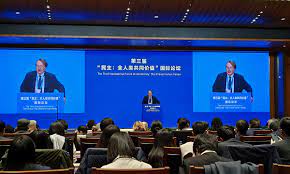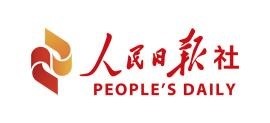By Wang Li, Wu Gang, People's Daily
The third "International Forum on Democracy: The Shared Human Values" was held in Beijing on March 20. Chinese and foreign guests engaged in discussions on topics including "Democracy and Modern Governance," "Democracy and the Rule of Law in the Digital Times," "AI and the Future of Democracy" and "Democracy and Global Governance in a Multipolar World."
Democracy is a common value of humanity and a concrete phenomenon that is constantly evolving. There are diverse ways for countries to realize democracy.
Guests attending the forum believe that there is no one-size-fits-all model of democracy. As long as it suits a country's national realities and represents the interests of the people, it is a democracy that works. Countries should respect the diversity of civilizations and respect other countries' rights to independently choose a path to democracy and the political system.
"Democracy should not be exported or imposed on other countries and regions," said former Italian Prime Minister Massimo D'Alema. He believes that there are many ways to achieve democracy and it cannot be standardized. Exchanges and mutual learning sustain civilizations, he added.
Former deputy speaker of the lower house of the Malaysian Parliament, Ong Tee Keat, noted that the practice of democracy is greatly influenced by the history and culture of each country. He called for respect for the diversity of democracy, saying what matters most in democracy is the relevance of the people's participation.
Former Thai Prime Minister Abhisit Vejjajiva said the world today lacks an effective and democratic global governance system. The international landscape has undergone significant changes, with many emerging market countries having a significant influence on global affairs. However, their representation and voice in international organizations remain inadequate.

"It is time to correct this imbalance in order to make the global governance system more fair and democratic," he added.
Democracy is an important hallmark of the progress and development of human civilization, an ideal that has always been cherished by the Communist Party of China (CPC) and the Chinese people. Guests attending the forum believe that China has developed a path to democracy with Chinese characteristics after long-term exploration.
Hassan Ragab, Egyptian director of the Confucius Institute at the Suez Canal University in Egypt, said that Chinese democracy is not a direct copy of the Western model, but rather one that has been developed based on China's historical and cultural traditions, and economic and social development.
Western democracy is not universally applicable, and the successful practice of Chinese democracy breaks the misconception that democracy can only be achieved through the Western way, he noted.
Chinese democracy is whole-process people's democracy. Stephen Perry, president emeritus of Britain's 48 Group Club, said that Chinese government hears its people and it tends to do what its people want. China has taken a democratic path that is in line with its national conditions, Perry noted, adding that China achieves democracy through a scientific method.
Zhang Shuhua, director of the institute of political sciences at the Chinese Academy of Social Sciences, said Chinese democracy is deeply rooted in the fertile soil of the Chinese culture and fully reflects the will of the Chinese people. It has effectively promoted the modernization of the country's governance system and capacity, making significant contributions to the political civilization of humanity, Zhang noted.
The China-proposed vision of building a community with a shared future for mankind, as well as the Belt and Road Initiative (BRI), the Global Development Initiative (GDI), the Global Security Initiative (GSI), and the Global Civilizations Initiative (GCI), have contributed Chinese wisdom and solutions to strengthening global governance and enriching and developing political civilization of humanity.
Participants at the forum believe that it is necessary to promote the building of a new type of international relations based on mutual respect, equity, justice and win-win cooperation, and to build a community with a shared future for mankind that is crucial for a better future of humanity.
Countries should build consensus, coexist harmoniously and be interdependent in a multipolar world, said Peter Kagwanja, the chief executive officer of the Africa Policy Institute (API), a Nairobi-based pan-African think tank.
The China-proposed BRI, GDI, GSI and GCI contribute to the building of a new type of international relations and the building of a community with a shared future for mankind, Kagwanja said.
Chen Bo, president of the China Institute of International Studies, said that promoting equal and orderly world multipolarity and inclusive economic globalization requires following humanity's common values of peace, development, fairness, justice, democracy and freedom.
"Only by adhering to these common values of humanity can we continuously improve the global governance system and promote the development of multipolarity, and constantly advance the cause of human progress," Chen remarked.


